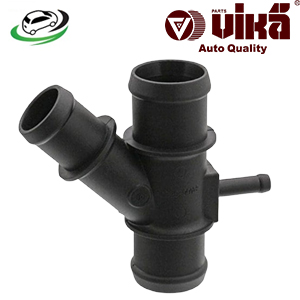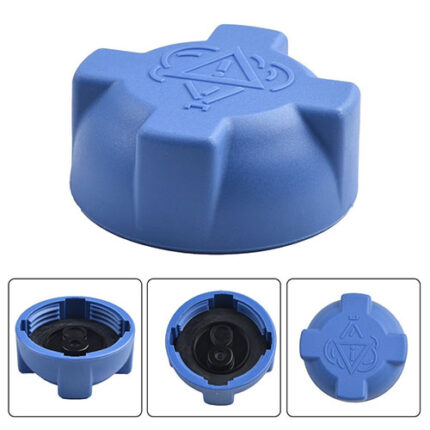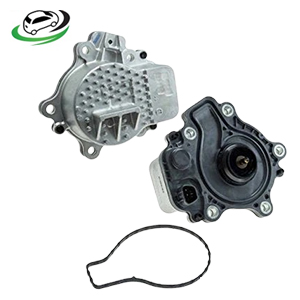-12%
Get Electric Water Pump Assembly Toyota Prius 10-2015/ Toyota Prius C 12-2019/ Toyota Prius V 12-2017 / 1NZ-FXE/2ZR-FXE Engines 161A0-29015
The electric water pump assembly is a modern component of a vehicle’s cooling system that has gained popularity for its efficiency and performance benefits. Unlike traditional belt-driven water pumps, the electric water pump uses an electric motor to drive the pump impeller, offering several advantages in terms of cooling system control and engine efficiency. This comprehensive overview covers the design, function, types, common issues, and maintenance of electric water pump assemblies.
Design and Function
Design:
- Components:
- Electric Motor: The core of the electric water pump assembly is an electric motor that powers the pump impeller. This motor is usually compact and designed to operate efficiently at various speeds.
- Pump Impeller: The impeller is the rotating component inside the pump that moves coolant through the cooling system. It is typically made from durable materials such as aluminum or high-strength plastic.
- Housing: The pump housing encloses the impeller and motor, providing structural support and housing the internal components. The housing is often made from aluminum or reinforced plastic to withstand the pressures and temperatures of the cooling system.
- Mounting Bracket: The assembly is mounted to the engine or cooling system using a bracket or housing that ensures proper alignment and secure installation.
- Functionality:
- Coolant Circulation: The primary function of the electric water pump is to circulate coolant through the engine and radiator. By moving coolant efficiently, the pump helps maintain optimal engine temperatures and prevents overheating.
- Variable Speed Control: Unlike traditional mechanical pumps driven by the engine’s belt, electric water pumps can operate at variable speeds. This allows for more precise control of coolant flow based on engine temperature and load conditions.
- On-Demand Operation: The electric water pump can be activated independently of the engine, allowing for better cooling system management during various operating conditions, such as idling or high-load scenarios.
Types of Electric Water Pumps:
- Single-Stage Electric Water Pumps:
- Design: These pumps feature a single impeller and motor setup. They are designed to provide a consistent flow rate of coolant through the system.
- Applications: Single-stage pumps are commonly used in vehicles with relatively straightforward cooling requirements and are often found in passenger cars and light trucks.
- Dual-Stage Electric Water Pumps:
- Design: Dual-stage pumps have two impellers or a multi-stage impeller system that allows for varying flow rates and pressure levels. This design provides enhanced cooling performance and flexibility.
- Applications: Dual-stage pumps are used in high-performance vehicles or applications where variable cooling demands are present, such as in high-load conditions or during aggressive driving.
- Integrated Electric Water Pumps:
- Design: Integrated pumps combine the water pump and the motor into a single unit with advanced control features. They often include additional sensors and electronic controls for optimized performance.
- Applications: These pumps are commonly used in modern vehicles with advanced cooling systems, hybrid vehicles, and electric vehicles, where precise control of coolant flow is essential for efficiency and performance.
Common Issues with Electric Water Pumps
- Electrical Failures:
- Motor Malfunction: Electrical issues can cause the electric motor to fail or operate intermittently. This can result from issues with the motor itself, wiring, or control systems.
- Symptoms: Symptoms of electrical failure include erratic or non-functioning pump operation, engine overheating, or warning lights on the dashboard indicating cooling system problems.
- Pump Impeller Issues:
- Blockages or Damage: The impeller can become blocked or damaged due to debris or wear. This can lead to reduced coolant flow and inefficient cooling.
- Symptoms: Symptoms of impeller issues include decreased engine cooling performance, unusual noises from the pump, or visible leaks around the pump area.
- Coolant Leaks:
- Seal Failure: The seals or gaskets in the electric water pump assembly can degrade over time, leading to coolant leaks.
- Symptoms: Leaks can be detected as puddles or drips under the vehicle, or visible coolant around the pump area. Low coolant levels or overheating may also indicate a leak.
- Overheating:
- Insufficient Flow: If the electric water pump fails to provide adequate coolant flow, the engine may overheat. This can be due to mechanical failure, electrical issues, or blockages.
- Symptoms: Overheating symptoms include an increase in engine temperature, steam or smoke from the engine compartment, and warning lights or gauges indicating high engine temperatures.
Maintenance and Replacement
- Regular Inspection:
- Visual Checks: Regularly inspect the electric water pump assembly for signs of leaks, damage, or corrosion. Check the pump and surrounding areas for coolant residue or moisture.
- Electrical Connections: Ensure that the electrical connections to the pump are secure and free of damage. Look for any signs of wiring issues or corrosion.
- Coolant System Maintenance:
- Coolant Level: Monitor the coolant level in the reservoir and radiator. Low coolant levels can indicate a leak or issue with the pump.
- Coolant Quality: Use the recommended type of coolant and ensure that it is clean and free of contaminants. Contaminated coolant can affect pump performance and lead to issues.
- Replacement:
- Timely Replacement: If the electric water pump is found to be faulty or damaged, it should be replaced promptly to avoid engine overheating and potential damage. Ensure that the replacement pump is compatible with your vehicle’s specifications.
- Professional Installation: Replacing an electric water pump may require specialized tools and expertise, especially for integrated or dual-stage pumps. Consider professional assistance for accurate installation and alignment.
- System Bleeding:
- Bleeding Procedure: After replacing the electric water pump or performing maintenance, it is important to bleed the cooling system to remove any trapped air. Follow the manufacturer’s recommended bleeding procedure to ensure that the system operates correctly and is free of air pockets.
- Electrical System Checks:
- Diagnostics: Use diagnostic tools to check the electrical system related to the electric water pump. This includes checking for any fault codes, testing the motor operation, and verifying the performance of the control system.
- Wiring Inspection: Inspect the wiring and connectors for any signs of damage or wear. Repair or replace any faulty components as needed.
Benefits of Electric Water Pumps
- Improved Efficiency:
- On-Demand Operation: Electric water pumps can operate independently of the engine, allowing for better cooling system management and efficiency. This helps in maintaining optimal engine temperatures and reducing fuel consumption.
- Variable Speed Control: The ability to adjust the pump speed based on engine conditions provides more precise control of coolant flow, improving overall cooling performance.
- Reduced Mechanical Load:
- Engine Load Reduction: By eliminating the need for a belt-driven pump, electric water pumps reduce the mechanical load on the engine, leading to improved fuel efficiency and reduced engine wear.
- Enhanced Cooling Performance:
- Consistent Cooling: Electric water pumps provide consistent and reliable coolant flow, improving engine cooling performance and helping prevent overheating in various driving conditions.
- Adaptability:
- Flexibility: Electric water pumps are adaptable to a wide range of cooling system designs and can be used in various applications, including hybrid and electric vehicles, where precise control of coolant flow is essential.
Follow us on Facebook for more parts.



